Evacuation chaos gripping Afghanistan a week after Taliban takeover
The United States and Germany have advised their nationals in Afghanistan to avoid traveling to the Kabul airport as chaos and insecurity persist in the capital with Afghans still scrambling to catch evacuation flights out of the country a week after the Taliban swept to power following a lightning military blitz.
The two countries cited “security risks” outside the Kabul airport gates as the reason for issuing the warning on Saturday.
Thousands of desperate people have gathered at the airport for the past week, hindering operations by the United States and European countries attempting to evacuate their diplomats and citizens as well as Afghans who worked for NATO forces.
“Because of potential security threats outside the gates at the Kabul airport, we are advising US citizens to avoid travelling to the airport and to avoid airport gates at this time unless you receive individual instructions from a US government representative to do so,” a US Embassy advisory said.
The German embassy also warned its nationals in an email that Taliban forces were conducting increasingly strict controls in its immediate vicinity.
The Taliban have called on individuals without travel documents to go home. At least 12 people have been killed in and around the single runway airfield since Sunday when the militants seized control of Afghanistan.
Taliban officials said the group was “aiming to improve the situation and provide a smooth exit” for people trying to leave over the weekend.
The administration of US President Joe Biden said it has over the past week evacuated 17,000 people, including 2,500 Americans, from Kabul.
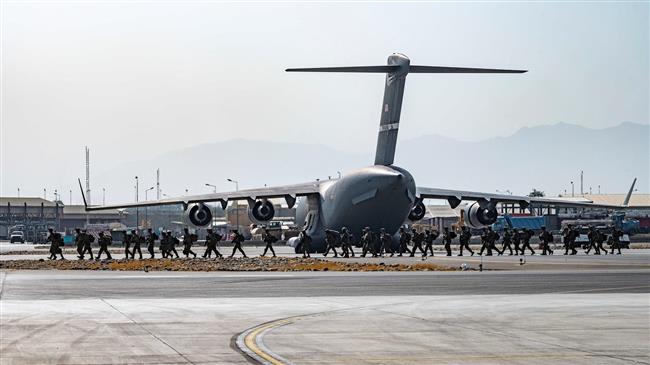
US to blame for Kabul airport evacuation chaos: Taliban
In the meantime, a senior Taliban official said on Sunday that the United States was to blame for the chaos at Kabul's airport as thousands of Afghans clamored to be evacuated from the country.
"America, with all its power and facilities... has failed to bring order to the airport. There is peace and calm all over the country, but there is chaos only at Kabul airport," said Amir Khan Mutaqi, a Taliban official.
‘US may compel airlines to carry evacuees’
The Biden administration has reportedly told US civilian airlines that they could be ordered to help ferry people being evacuated from Afghanistan.
One official, speaking to Reuters on condition of anonymity, said a "warning order" had been issued to carriers on Friday, telling the companies they could be used, but no decision had been made.
The official said the civilian aircraft would not fly into Afghanistan but would instead ferry evacuees from air bases in locations including the Middle East and Germany.
The US-led invasion of Afghanistan removed the Taliban from power 20 years ago, but it worsened the security situation in the country. The militants intensified their offensive and rapidly overran major cities after Biden ordered a hasty withdrawal of American forces by September 1.
The Taliban laid siege to Kabul last Sunday, forcing the sitting Afghan president, Ashraf Ghani, to flee the country. The runaway president later said his abrupt departure had been meant to avoid bloodshed.
The unfolding events have led to immense confusion in recent days, with thousands of Afghan civilians and diplomats swarming Kabul airport to take evacuation flights.
Blair slams 'abandonment' of Afghanistan
On Saturday, former British prime minister Tony Blair blasted what he called the "abandonment" of Afghanistan by the US and Western governments as "dangerous” and “unnecessary.”
"The abandonment of Afghanistan and its people is tragic, dangerous, unnecessary, not in their interests and not in ours," Blair wrote in a wide-ranging article published on his institute's website.
"We didn't need to do it. We chose to do it. We did it in obedience to an imbecilic political slogan about ending 'the forever wars', as if our engagement in 2021 was remotely comparable to our commitment 20 or even 10 years ago."
The former prime minister, who sent British troops into Afghanistan in 2001, said the decision to withdraw troops was driven "not by grand strategy but by politics.”
Blair said Britain had received "little or no consultation" from Washington over the Afghan withdrawal and that London was "at risk of relegation to the second division of global powers.”
Meanwhile, British Foreign Secretary Dominic Raab, who has faced sustained criticism for being on holiday when Kabul collapsed, conceded that Moscow and Beijing would play a bigger role in Afghanistan after the Taliban’s shock seizure of the country amid the withdrawal of NATO forces.
Raab told The Sunday Telegraph that London would have to turn to Russia and China to exercise a "moderating influence" over the Taliban despite a mistrust between the UK and those governments.
"We're going to have to bring in countries with a potentially moderating influence like Russia and China, however uncomfortable that is," Raab said. "It will give us a group to exercise greater influence and better convey our messages to the Taliban."
British forces have evacuated 3,821 people from Kabul since August 13, according to Britain's Ministry of Defense, including 1,323 who have made it to the UK thus far.
The evacuees include embassy staff, British nationals and those eligible under the Afghan Relocation and Assistance Policy (ARAP) program, which offers priority relocation to those assessed to be at serious risk of threat to life.
Britain and China have recently been at odds over various issues, including Hong Kong and alleged human rights abuses against China's Uyghur Muslims in the northwestern region of Xinjiang.
Ties between London and Moscow also have been sour since the 2018 alleged poisoning of ex-double agent Sergei Skripal, who was accused of betraying hundreds of Russian agents to Britain's MI6 foreign spy service.
Seven Afghans killed in chaos at Kabul airport: British military
The British military said Sunday that the chaos around Kabul’s international airport saw another seven Afghan civilians killed in crowds.
The British military said the fatalities were the result of stampedes and crushing injuries caused by Taliban militants firing into the air to drive away those desperate to get on any flight out of the country.
“Conditions on the ground remain extremely challenging but we are doing everything we can to manage the situation as safely and securely as possible,” the UK Defense Ministry said in a statement.
EU rejects recognition of Taliban
In another development on Saturday, EU Commission President Ursula von der Leyen said the bloc has not recognized the Taliban and that it has no plans to hold political talks with the militants.
Von der Leyen also said she would propose an increase in the $67 million in humanitarian aid which the Commission had allocated this year for Afghanistan.
The EU Commission president underlined that the aid is tied to the Taliban’s respect for human rights, good treatment of minorities and respect for the rights of women and girls.
"We may well hear the Taliban's words but we will measure them above all by their deeds and actions," she told a news conference.
She said the Commission was ready to provide funding to EU countries that help resettle refugees and added that she planned to raise the resettlement issue at a G7 meeting next week.
Afghan army collapsed at 'breathtaking pace': Merkel
Moreover, German Chancellor Angela Merkel conceded on Saturday that the perception about the Afghan army’s resistance against the Taliban had been misjudged.
“The army collapsed at a breathtaking pace,” Merkel said at an election event. “We had expected the resistance to be stronger.”
Merkel said the focus now was on rescuing people from Afghanistan, but later there would be a need for discussions on what had or had not been achieved.
Putin, Erdogan agree to bolster coordination on Afghan issues
The Kremlin said in a statement on Saturday that Russia's President Vladimir Putin and Turkey's President Recep Tayyip Erdogan had discussed the situation in Afghanistan during a phone call and agreed to strengthen bilateral coordination on Afghan issues.
The presidents emphasized the priorities were counter-terrorism and tackling drug trafficking, the Kremlin added.
The Turkish president was reported to have voiced hopes for a soft transition in the war-torn country and said that it was important for the Taliban not to repeat previous mistakes and to keep their promises with an ethnically inclusive approach.
"The new government to be formed in Afghanistan should be inclusive and representative of the diversity of the Afghan people," Erdogan told Putin, according to a readout following the call.
Erdogan said on Wednesday that Turkey still aims to maintain security at Kabul airport following the Taliban’s takeover of the capital.
Turkey can't take new migrant wave from Afghanistan: Erdogan
Separately on Saturday, the Turkish president said his country would not be able to cope with an "additional burden of migrants" arriving from Afghanistan.
"A new wave of migration is inevitable if the necessary measures are not taken in Afghanistan and in Iran," Erdogan said during a telephone call with Chancellor Merkel. "Turkey, which already has five million refugees, cannot take an additional burden of migrants.”
Merkel's office, for its part, responded by saying that the evacuation of people from Afghanistan remains "the top priority.”
The two leaders agreed to "close cooperation to support the work of international organizations, in particular, UN refugee aid agencies, in Afghanistan and in neighboring countries," said a spokeswoman for Merkel.
Erdogan also accused Brussels of being "evasive" with regard to Ankara's request to revise a 2016 deal between Turkey and the European Union aimed at stemming flows of would-be refugees.
After a peak in 2015 when more than one million migrants came to the EU, mostly from Syria, Afghanistan and Iraq, the EU has cut the number of arrivals owing to a deal with Turkey, which receives EU funds to host asylum seekers in its territory.
The EU has warned that it may be "impossible" to get all allied Afghans out by the end of August as the United States and allies were racing against "time and space" in the increasingly chaotic and dangerous bid to evacuate their people from Taliban-held Afghanistan.
Over 7,000 evacuated to Qatar from Afghanistan
Meanwhile, a Qatari official said more than 7,000 people have been evacuated from Afghanistan to the Persian Gulf state, as thousands scrambled to leave Kabul.
“Since the start of international operations, over 7,000 people have been evacuated from Afghanistan to Qatar,” the official who declined to be identified said.
“At the request of NGOs, educational institutions and international media organizations, we evacuated hundreds of Afghan employees and their families, as well as female students across the country,” the official added.
That came “in addition to facilitating the evacuation of citizens from the United States of America, Germany and the United Kingdom, among others. Our evacuation effort is ongoing.”
The Qatari official said Doha will eventually settle up to 8,000 Afghans and that many of the 7,000 people currently in Qatar were transiting to third countries.
Three districts taken by anti-Taliban forces in north
Also on Saturday, forces resisting the Taliban in northern Afghanistan said they have taken three districts close to the Panjshir valley, where remnants of government forces and other militia groups have gathered.
Afghan Defense Minister General Bismillah Mohammadi said in a tweet that the districts of Deh Saleh, Bano and Pul-Hesar in the neighboring province of Baghlan to the north of Panjshir had been taken.
Afghanistan’s Tolo News also quoted a local police commander who said Bano district in Baghlan was under the control of local militia forces and said there had been heavy casualties.
Former Vice President Amrullah Saleh and Ahmad Massoud, son of former commander Ahmad Shah Massoud, have vowed to resist the Taliban from Panjshir.
People close to Massoud say that more than 6,000 fighters, made up of remnants of army and Special Forces units as well as local militia groups, have gathered in the valley.
The mountainous Panjshir valley remains the only holdout against the Taliban after the militants took control of Afghanistan.
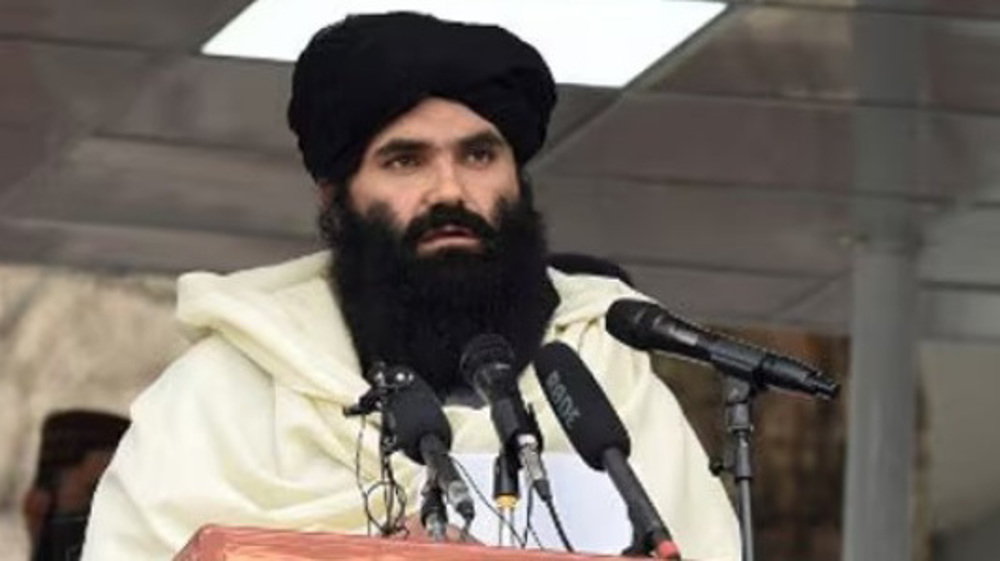
Taliban says US has lifted $10 million reward for information on deputy chief Haqqani
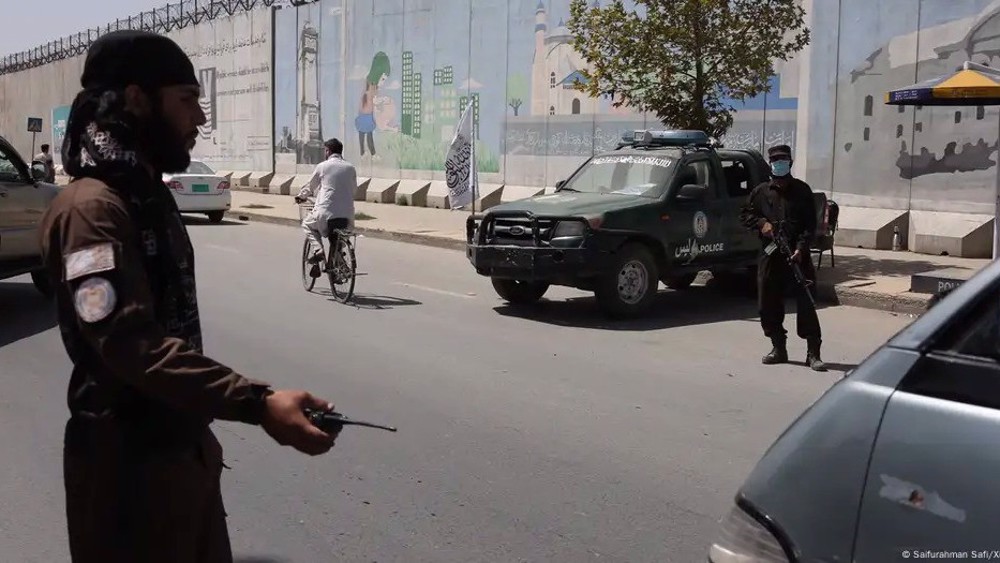
Deadly bombing attack targets Taliban ministry building in Kabul
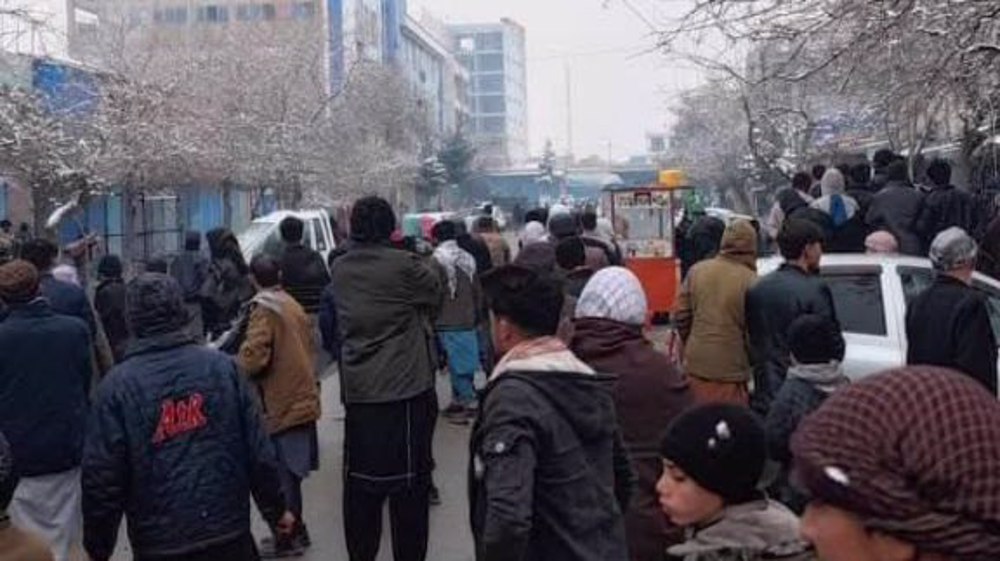
Daesh claims deadly bombing attack in northern Afghanistan
VIDEO | Austria protests mourn Gaza deaths
Ex-spy chief urges ‘revolt’ against Israeli regime; says Tel Aviv must be ‘stopped’
VIDEO | Press TV's news headlines
VIDEO | Paris hosts ‘end famine’ rally in support of Gaza
Global reactions, offers of assistance pour in after huge deadly explosion in S Iran
Iran pres. stresses collective, effective fight against terrorism in calls with India, Pakistan PMs
VIDEO | Iran-US indirect talks
Iran declares holiday in Bandar Abbas port as fire still raging


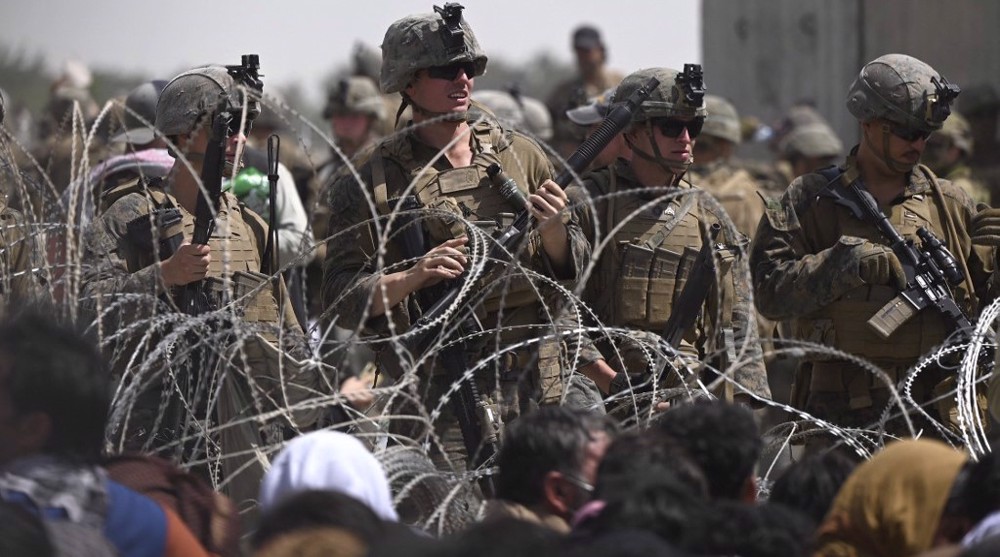

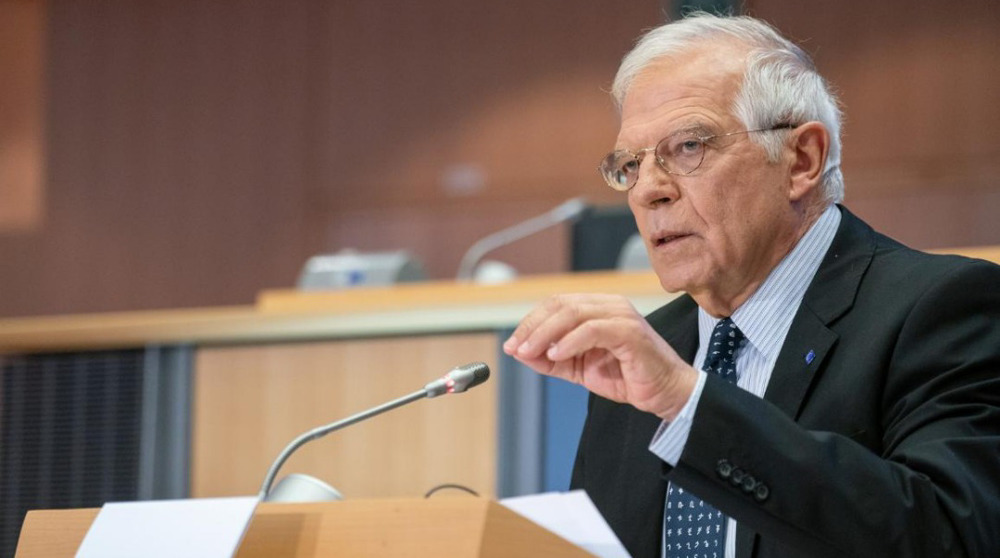
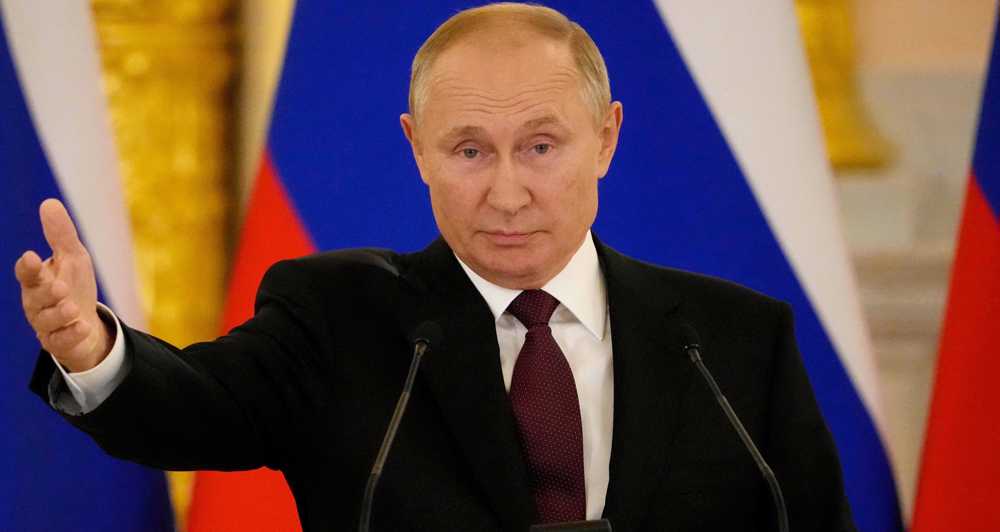




 This makes it easy to access the Press TV website
This makes it easy to access the Press TV website